.jpg.webp)
Bosnia and Herzegovina is a signatory to the Vienna Convention on Road Signs and Signals. Therefore, road signs do not differ much from the rest of Europe, such as Croatia, Slovenia, Serbia and North Macedonia. Ministry of Transportation of Bosnia and Herzegovina regulates them. Bosnia and Herzegovina drives on the right as with the rest of Europe, except for Cyprus, Ireland, Malta and the United Kingdom. Bosnian and Herzegovinan road signs have two scripts, Latin and Cyrillic script.
The former Yugoslavia had originally signed the Vienna Convention on Road Signs and Signals on November 8, 1968 and ratified it on June 6, 1977.[1] Yugoslavia formerly used a yellow background on warning signs. After the breakup of Yugoslavia when Bosnia and Herzegovina declared its independence in 1992, the country succeeded to the Vienna Convention on January 12, 1994.
Priority signs
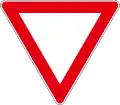 Give way
Give way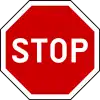 Stop
Stop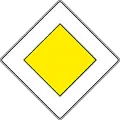 Priority road
Priority road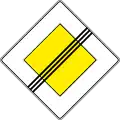 End of priority road
End of priority road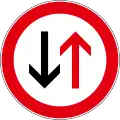 Priority for oncoming traffic
Priority for oncoming traffic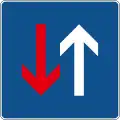 Priority over oncoming traffic
Priority over oncoming traffic
Warning signs
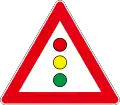 Traffic lights ahead
Traffic lights ahead Traffic lights (horizontal) ahead
Traffic lights (horizontal) ahead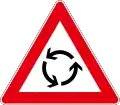 Roundabout ahead
Roundabout ahead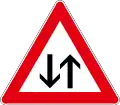 Two-way traffic
Two-way traffic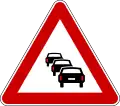 Traffic Queues
Traffic Queues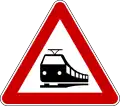 Level crossing without barriers ahead
Level crossing without barriers ahead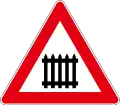 Level crossing with barriers ahead
Level crossing with barriers ahead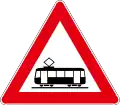 Tramway
Tramway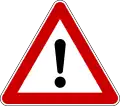 Other danger
Other danger Single track level crossing
Single track level crossing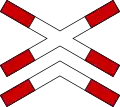 Multiple track level crossing
Multiple track level crossing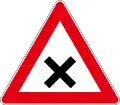 Intersection of crossroads of the same importance
Intersection of crossroads of the same importance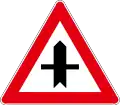 Intersection with a side road at right angles
Intersection with a side road at right angles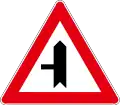 Joining a Side road at right angles to the left
Joining a Side road at right angles to the left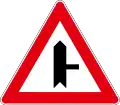 Joining a Side road at Right angles to the right
Joining a Side road at Right angles to the right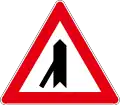 Joining the side road at a sharp angle to the left
Joining the side road at a sharp angle to the left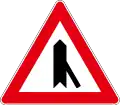 Joining the side road at a sharp angle to the right
Joining the side road at a sharp angle to the right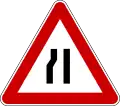 Road narrows on left side
Road narrows on left side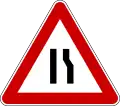 Road narrows on right side
Road narrows on right side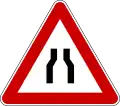 Road narrows
Road narrows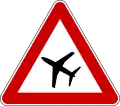 Low-flying aircraft
Low-flying aircraft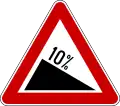 Steep descent
Steep descent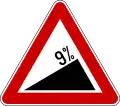 Steep ascent
Steep ascent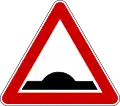 Bump
Bump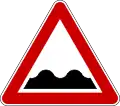 Uneven road
Uneven road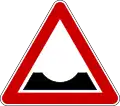 Dip
Dip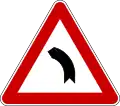 Curve to left
Curve to left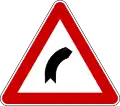 Curve to right
Curve to right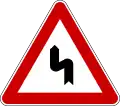 Double curve, first to left
Double curve, first to left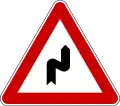 Double curve, first to right
Double curve, first to right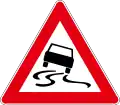 Slippery road
Slippery road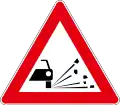 Loose gravel
Loose gravel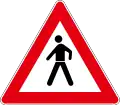 Pedestrians
Pedestrians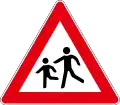 Children
Children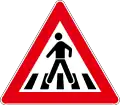 Pedestrian crossing ahead
Pedestrian crossing ahead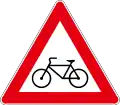 Cyclists
Cyclists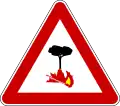 Warning of fire
Warning of fire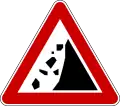 Fallen rocks (left)
Fallen rocks (left)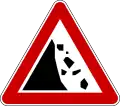 Fallen rocks (right)
Fallen rocks (right) Opening or swing bridge
Opening or swing bridge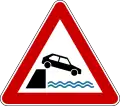 Quayside or riverbank ahead
Quayside or riverbank ahead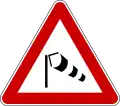 Crosswind from the right
Crosswind from the right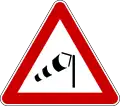 Crosswind from the left
Crosswind from the left Rolling over or slipping of the vehicle
Rolling over or slipping of the vehicle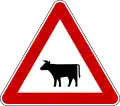 Animals
Animals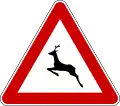 Wild animals
Wild animals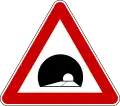 Tunnel
Tunnel The bottom plate with one red line indicates a distance of 80 meters from the railway
The bottom plate with one red line indicates a distance of 80 meters from the railway The lower plate with two red lines indicates a distance of 160 m from the railway
The lower plate with two red lines indicates a distance of 160 m from the railway The lower plate with three red lines indicates a distance of 240 m from the railway
The lower plate with three red lines indicates a distance of 240 m from the railway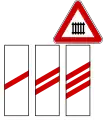 Distance panels for level crossing with barriers
Distance panels for level crossing with barriers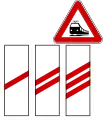 Distance panels for level crossing without barriers
Distance panels for level crossing without barriers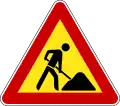 Roadworks
Roadworks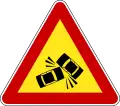 Accident ahead
Accident ahead Children!
Children! Children!
Children!
Prohibitory signs
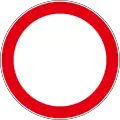 All vehicles prohibition in both directions
All vehicles prohibition in both directions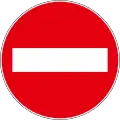 No entry
No entry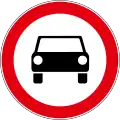 No cars
No cars No mopeds
No mopeds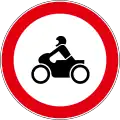 No motorbikes
No motorbikes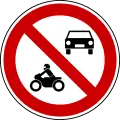 No motorbikes and cars
No motorbikes and cars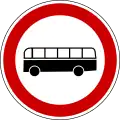 No Buses
No Buses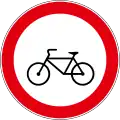 No Bikes
No Bikes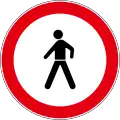 No Pedestrians
No Pedestrians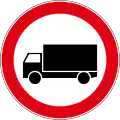 No trucks
No trucks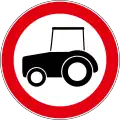 No Tractors
No Tractors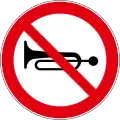 No use horns
No use horns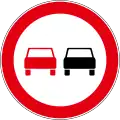 Overtaking forbidden
Overtaking forbidden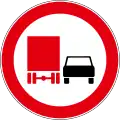 Overtaking forbidden for trucks
Overtaking forbidden for trucks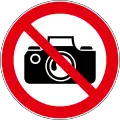 No photography
No photography.svg.png.webp) Speed limit (50km/h)
Speed limit (50km/h).svg.png.webp) Speed limit (30km/h)
Speed limit (30km/h)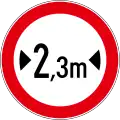 Vehicle width limit
Vehicle width limit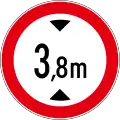 Vehicle height limit
Vehicle height limit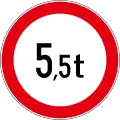 Vehicles weight limit
Vehicles weight limit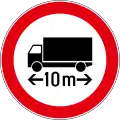 Maximum Length For Trucks
Maximum Length For Trucks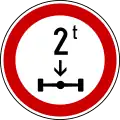 Maximum Weight per Axle
Maximum Weight per Axle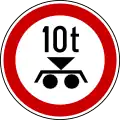 Maximum Weight per Tandem Axle
Maximum Weight per Tandem Axle No Vehicles carrying Dangerous Goods
No Vehicles carrying Dangerous Goods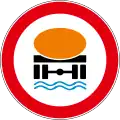 No Vehicles carrying Dangerous Water Pollutants
No Vehicles carrying Dangerous Water Pollutants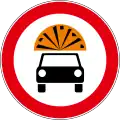 No Vehicles carrying Explosives
No Vehicles carrying Explosives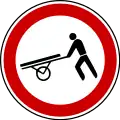 No handcarts
No handcarts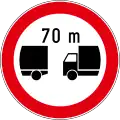 Minimum Safe Distance
Minimum Safe Distance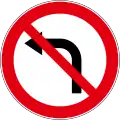 No Left Turn
No Left Turn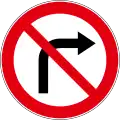 No Right Turn
No Right Turn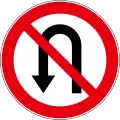 No U-turn
No U-turn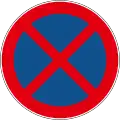 No stopping
No stopping No parking
No parking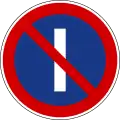 No parking at uneven days
No parking at uneven days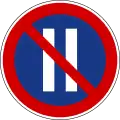 No parking at even days
No parking at even days
Mandatory signs
 Proceed straight
Proceed straight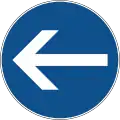 Turn left
Turn left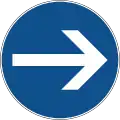 Turn right
Turn right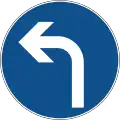 Turn left ahead
Turn left ahead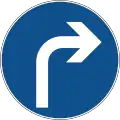 Turn right ahead
Turn right ahead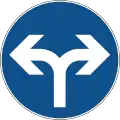 Turn left or right
Turn left or right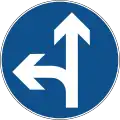 Proceed straight or turn left
Proceed straight or turn left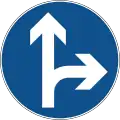 Proceed straight or turn right
Proceed straight or turn right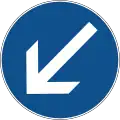 Pass onto left
Pass onto left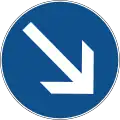 Pass onto right
Pass onto right Pass on either side
Pass on either side U-turn
U-turn Roundabout
Roundabout Headlamp
Headlamp Proceed straight for Trucks
Proceed straight for Trucks Proceed straight for Vehicles Carrying Dangerous Goods
Proceed straight for Vehicles Carrying Dangerous Goods Manual Traffic Control
Manual Traffic Control Winter Equipment Mandatory
Winter Equipment Mandatory.svg.png.webp) Minimum speed limit (40km/h)
Minimum speed limit (40km/h) Bikes Only
Bikes Only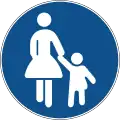 Pedestrians Only
Pedestrians Only Rider horses Only
Rider horses Only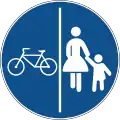 Pedestrians and Bikes Only
Pedestrians and Bikes Only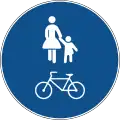 Pedestrians and bikes only
Pedestrians and bikes only
Guide signs
 One-way Street
One-way Street One-way Street (left)
One-way Street (left) One-way Street (right)
One-way Street (right)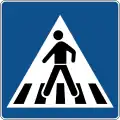 Pedestrian Crossing
Pedestrian Crossing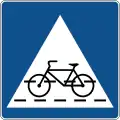 Bicycle Crossing
Bicycle Crossing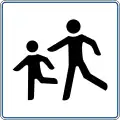 Children
Children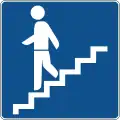 Underground/overground passage
Underground/overground passage Speed Bump
Speed Bump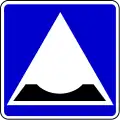 Dip
Dip Living Street
Living Street
Indication signs
 Water protection area
Water protection area School Patrol
School Patrol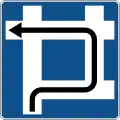 The road of movement of the vehicle to the intersection where it is forbidden to turn left
The road of movement of the vehicle to the intersection where it is forbidden to turn left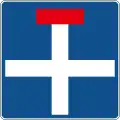 Dead end
Dead end Restrictions in available lanes
Restrictions in available lanes Use of lanes
Use of lanes Hospital (FBiH)
Hospital (FBiH) Hospital (RS)
Hospital (RS) Police (FBiH)
Police (FBiH) Police (RS)
Police (RS)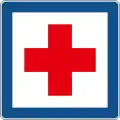 First aid station
First aid station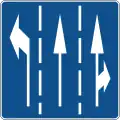 Use of lanes at an intersection
Use of lanes at an intersection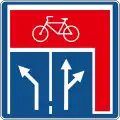 Use of lanes at an intersection for bicycles
Use of lanes at an intersection for bicycles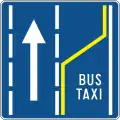 End of lane for buses and taxis
End of lane for buses and taxis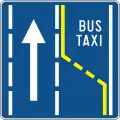 Lane for buses and taxis
Lane for buses and taxis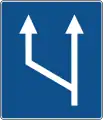 Increased lane
Increased lane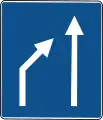 Lane reduction
Lane reduction Speed control
Speed control Traffic control
Traffic control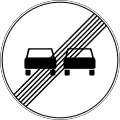 Overtaking prohibition ends
Overtaking prohibition ends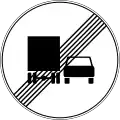 Overtaking prohibiton for trucks ends
Overtaking prohibiton for trucks ends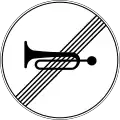 Ban on honking ends
Ban on honking ends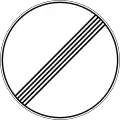 End of previous prohibitions
End of previous prohibitions.svg.png.webp) Minimum speed ends (40km/h)
Minimum speed ends (40km/h).svg.png.webp) Posted speed limit ends (40km/h)
Posted speed limit ends (40km/h)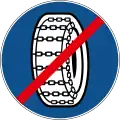 End of mandatory winter tyres or chains for tyres
End of mandatory winter tyres or chains for tyres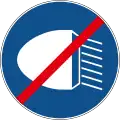 End of headlight obligation
End of headlight obligation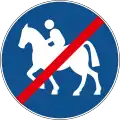 Horse track ends
Horse track ends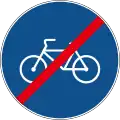 End of bike only
End of bike only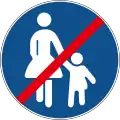 End of pedestrians only
End of pedestrians only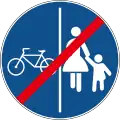 Footpath ends
Footpath ends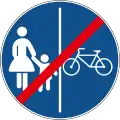 Footpath ends
Footpath ends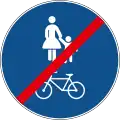 Pedestrian and bicycle path end
Pedestrian and bicycle path end End of living street
End of living street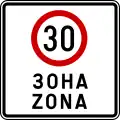 Speed Limit Zone
Speed Limit Zone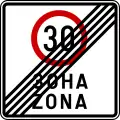 End of Speed Limit Zone
End of Speed Limit Zone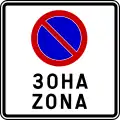 No Park Zone
No Park Zone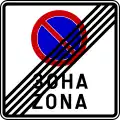 End of no Park Zone
End of no Park Zone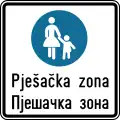 Pedestrian zone
Pedestrian zone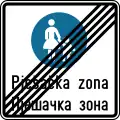 End of pedestrian zone
End of pedestrian zone Recommended speed limit
Recommended speed limit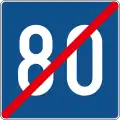 End of recommended speed limit
End of recommended speed limit Parking zone
Parking zone Parking Garage
Parking Garage Parking Time Limit
Parking Time Limit River
River Bridge
Bridge Wildlife crossing
Wildlife crossing Signpost
Signpost Built-up Area
Built-up Area End of Built-up Area
End of Built-up Area Altitude of the pass
Altitude of the pass Electric vehicle charging station
Electric vehicle charging station Road information radio
Road information radio Bus Stop
Bus Stop Taxi stand
Taxi stand Tram stop
Tram stop Airport
Airport Port
Port Petrol station
Petrol station Hotel
Hotel Public toilet
Public toilet Fire extinguisher
Fire extinguisher Telephone
Telephone Information center
Information center Cafe shop
Cafe shop Restaurant shop
Restaurant shop Land for caravans
Land for caravans Land for RVs
Land for RVs Self water discharge
Self water discharge Camping area
Camping area Car wash
Car wash Tire dealer
Tire dealer Road assistance
Road assistance Tool service Area
Tool service Area Drinking water
Drinking water Vila
Vila Park
Park Street sign
Street sign%252C_500x500%253B_StVO_1992.svg.png.webp) Chevrons
Chevrons%252C_500x500%253B_StVO_1992.svg.png.webp) Chevrons
Chevrons%252C_500x1500%252C_StVO_1992.svg.png.webp) Chevrons
Chevrons%252C_500x1500%252C_StVO_1992.svg.png.webp) Chevrons
Chevrons
Highway and Expressway signs
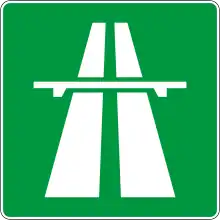 Motorway
Motorway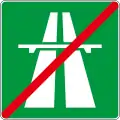 Motorway ends
Motorway ends Motorway signpost
Motorway signpost Motorway signpost
Motorway signpost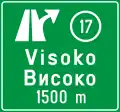 Notice of exit along the freeway
Notice of exit along the freeway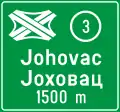 Notice of exit for freeway junction
Notice of exit for freeway junction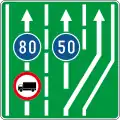 Third lane
Third lane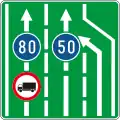 End of third lane
End of third lane Exit sign
Exit sign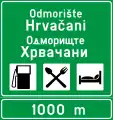 Rest Stop
Rest Stop Motorway information
Motorway information River
River Notice of toll payment along the motorway
Notice of toll payment along the motorway Notice of toll payment along the motorway
Notice of toll payment along the motorway International road number
International road number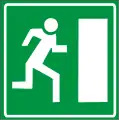 Emergency exit
Emergency exit Emergency exit
Emergency exit Highway number
Highway number Mileage on the highway
Mileage on the highway Motorized vehicles Only
Motorized vehicles Only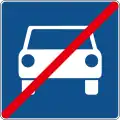 End of Motorized vehicles Only
End of Motorized vehicles Only Emergency stop
Emergency stop Emergency stop
Emergency stop Wrong way
Wrong way Expressway road number
Expressway road number Progressive mileage on the expressway
Progressive mileage on the expressway Built-up Area on a Highway
Built-up Area on a Highway End of Built-up Area on a Highway
End of Built-up Area on a Highway
Direction signs
 Highway signpost
Highway signpost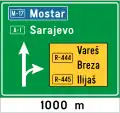 Pre-signaling of directions on the motorway
Pre-signaling of directions on the motorway Pre-signaling of directions on the extra-urban road
Pre-signaling of directions on the extra-urban road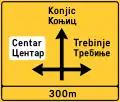 Pre-signaling of directions on the extra-urban road
Pre-signaling of directions on the extra-urban road Pre-signposting of directions on an extra-urban road at an intersection with a circle road
Pre-signposting of directions on an extra-urban road at an intersection with a circle road Pre-signaling of directions on the Expressway
Pre-signaling of directions on the Expressway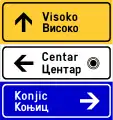 Pre-signaling of directions on the extra-urban road
Pre-signaling of directions on the extra-urban road Signpost for secondary road
Signpost for secondary road Confirmation signal for extra-urban roads
Confirmation signal for extra-urban roads
Border crossing signs
 Border crossing
Border crossing National car sign
National car sign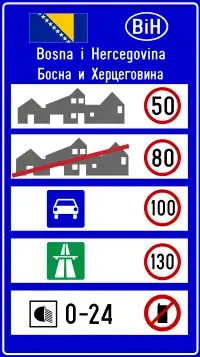 National speed limits
National speed limits
Checkpoint signs
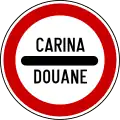 Customs
Customs Police
Police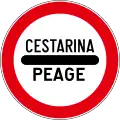 Toll (FBiH)
Toll (FBiH)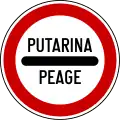 Toll (RS)
Toll (RS)
References
- ↑ "United Nations Treaty Collection". treaties.un.org. Retrieved 2023-12-08.